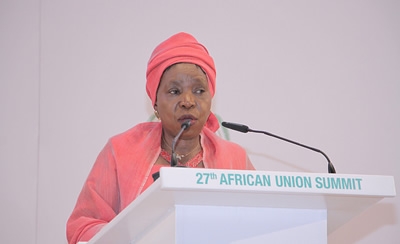
In preparation of the 27th African Union summit, scheduled for 17-18 July, 2016, in Kigali Rwanda, the executive Council is meeting from 13-15 July, to prepare the agenda of the AU Summit and provide appropriate recommendations for consideration by the Heads of State.
In the official opening of the 29th Ordinary Session of the Executive Council of the African Union, at Kigali, convention Centre, a key message that was common in all the speeches made by the Representative of the host Government of Rwanda; Chairperson of the Executive Council; Chairperson of the African Union Commission and Opening statement by the Chair of the EC, was the need for Africa to focus on its priorities and commit to effectively and efficiently implement Agenda 2063, and its First Ten Year Implementation Plan. More strongly was the call for peace and security in the continent and that the Commitment to Silencing the Guns, guide African countries in dealing with conflict, to ensure that available limited financial resources are not wasted on war but development.
In particular, the Chairperson of the African Union, Her Excellency, Dr. Nkosazana Dhlamini Zuma echoed the need to “strengthen Africa’s capacities to take the actions needed today, many of these capacities for the implementation of Agenda 2063 are within Africa’s power and choosing”. This is in tandem with the sentiments that the African Capacity Building Foundation (ACBF) has always echoed in various platforms, calling for Africa to invest and develop its capacities, be they hard or soft capacities, so that Africans can be masters of their own destinies.
In its new Strategic Plan, ACBF Strategy 2017-2021, ACBF envisages an “Africa capable of its own development”, through investment particularly in implementation capacities. ACBF, as the apex institution for capacity development in Africa, and as a member of the Continental Coordination Mechanism that includes the African Union, Africa Development Bank, Economic Commission for Africa and the Regional Economic Communities, which Dr Nkosazana Dhamini Zuma, cited as key in Transforming the continent, will continue to support Africa’s transformation agenda focusing on (i) supporting effective delivery of continental development priorities; (ii) Countries to achieve tangible development results; (iii) Enhancing private sector and civil society contributions to sustainable development and (iv) Leveraging knowledge and learning to increase development effectiveness. These four areas of intervention make up the ACBF’s Strategic Pillars which will allow the Foundation to comprehensively coordinate the Continent’s capacity development initiatives at Continental level, regional and national level, with emphasis on impacting communities for inclusive growth and developmental progression.
To date ACBF has made some tremendous contributions to the implementation of Agenda 2063. The Foundation has conducted a capacity needs assessment for the implementation of Agenda 2063, and further, an assessment of internal and external risks associated with the implementation of the Agenda 2063, which have provided a good basis for discussions in the African Union as well as other developmental Forums.
In assessing the capacity needs required for the implementation of the first 10-year plan of Agenda 2063, ACBF has conducted three critical studies: (i) Capacity Requirements for Agenda 2063; (ii) Capacity Development Plan Framework; and (iii) African critical technical skills: A key Capacity dimension needed for implementing programmes in the first ten years of Agenda 2063.
As the AU Summit continues, it is hoped that the Heads of State will come up with actionable decisions on how to progress Africa’s transformation agenda, with deliberate action plans to invest in capacity development, whilst giving special attention to women rights and empowerment.





